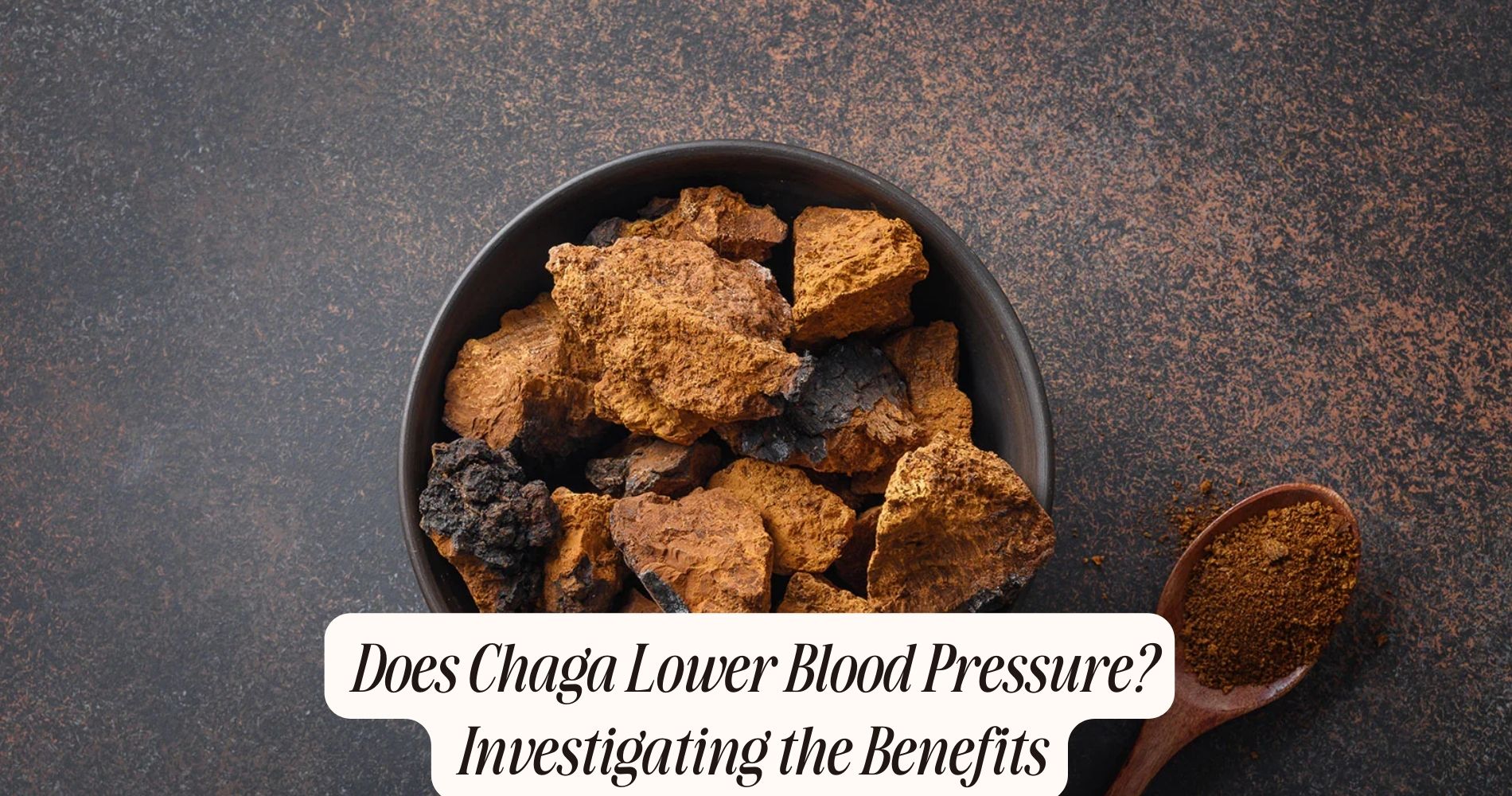
Does Chaga Lower Blood Pressure? Investigating the Benefits
Does chaga lower blood pressure? Chaga, a medicinal fungus, might help lower blood pressure due to its rich bioactive compounds and antioxidants. Betulinic acid, present in chaga, shows anti-inflammatory and antioxidant benefits that are potentially effective against hypertension. Additionally, polysaccharides in chaga support immune function and may aid in maintaining healthier blood pressure levels. While some studies suggest chaga has vasodilatory effects and can improve lipid profiles, more extensive human trials are needed for definitive conclusions. It is crucial to use chaga as part of a broader health strategy and consult healthcare professionals before starting any new supplement. For a deeper understanding, stay engaged.
What Is Chaga?
Chaga is a type of medicinal fungus that grows primarily on birch trees in cold climates. Its history dates back centuries, with traditional use in Russia, Northern Europe, and parts of Asia. Indigenous populations recognized its medicinal potential long before modern science began to study it. Historically, they used it for its purported immune-boosting properties and overall health benefits.
When it comes to chaga harvesting, the process is both intricate and precise. Chaga grows over several years, forming a hard, black mass known as a sclerotium. Harvesters typically locate these fungi on birch trees, as chaga thrives in the nutrient-rich bark. The ideal time for harvesting is during the colder months when the active compounds are most concentrated.

It's vital to harvest chaga sustainably—only a portion is removed to ensure the fungus can continue to grow. This careful method helps maintain ecological balance and assures a consistent supply.
Understanding chaga's history and the meticulous process of chaga harvesting gives you insight into its longstanding value and the delicate balance required to procure it. This foundation sets the stage for exploring its potential health benefits, including its impact on blood pressure.
Nutritional Profile of Chaga
To truly appreciate chaga's potential health benefits, it's important to first understand its rich nutritional profile. Chaga, a type of fungus found primarily on birch trees in cold climates, is packed with essential nutrients.
You'll find that it's a rich source of polysaccharides, specifically beta-glucans, which are known for their immune-boosting properties. In addition, chaga contains a wide array of antioxidants, including superoxide dismutase and phenolic compounds, which combat oxidative stress.
One of the key chaga benefits is its high concentration of B vitamins, particularly B1, B2, and B5. These vitamins play significant roles in energy metabolism and maintaining healthy skin and nerves. Moreover, chaga sources reveal that it's also rich in essential minerals such as potassium, zinc, and manganese. These minerals contribute to various bodily functions, including enzyme activities and bone health.
Another remarkable component is its high melanin content, which has been linked to skin health and protection against UV damage. By analyzing these elements, you can see how the extensive nutritional profile of chaga contributes to its health-promoting properties, forming the basis for investigating its potential effects on blood pressure.
How Chaga Affects Blood Pressure
Research suggests that incorporating chaga into your diet may contribute to regulating blood pressure levels. Chaga extracts are rich in bioactive compounds that seem to influence cardiovascular health.
One of the key chaga compounds is betulinic acid, known for its anti-inflammatory and antioxidant properties. These properties can help reduce oxidative stress and inflammation, both of which are linked to hypertension.
Another significant chaga compound is polysaccharides, which have been shown to improve immune function and may indirectly support healthier blood pressure. The presence of these compounds in chaga extracts could potentially promote vasodilation, the widening of blood vessels, consequently lowering blood pressure.

Additionally, chaga contains triterpenes, which have been studied for their ability to improve lipid profiles. By reducing bad cholesterol levels, triterpenes can help maintain arterial health and prevent hypertension.
It's important to note that while chaga shows promise, its effects on blood pressure may vary from person to person. Thus, including chaga in your diet should be part of a broader strategy that includes other lifestyle changes like exercise and a balanced diet.
Always consult with a healthcare provider before making significant changes to your health regimen.
Scientific Studies on Chaga
Several scientific studies have explored the potential health benefits of chaga, particularly its effects on blood pressure and cardiovascular health. Researchers have found that chaga may possess antioxidant and anti-inflammatory properties, which could contribute to its cardiovascular benefits.
One study published in the Journal of Ethnopharmacology indicated that chaga extract could reduce oxidative stress in animal models, a factor closely linked to hypertension and cardiovascular diseases.
Chaga research also extends to its possible vasodilatory effects. A study in the Journal of Cardiovascular Pharmacology demonstrated that chaga extracts might help relax blood vessels, potentially lowering blood pressure. This vasodilation effect is believed to result from chaga's rich content of polysaccharides and triterpenoids, compounds known for their vascular benefits.
Furthermore, a review in the International Journal of Medicinal Mushrooms compiled various studies on chaga benefits, highlighting its potential to modulate blood pressure by reducing inflammation and improving endothelial function. These findings suggest that chaga could be a supportive supplement for cardiovascular health.
However, while these studies are promising, more extensive human trials are needed to conclusively establish chaga's efficacy in lowering blood pressure. Always consult healthcare professionals before incorporating new supplements into your regimen.
Potential Side Effects
While chaga offers potential health benefits, it's important to be aware of its possible side effects.
Chaga interactions with other medications can pose significant risks. For example, chaga can affect blood clotting, so if you're on anticoagulants like warfarin, you should exercise caution. Chaga has compounds that might amplify the effects of blood thinners, increasing the risk of bleeding.
Additionally, chaga contraindications include its impact on blood sugar levels. If you have diabetes and are on insulin or other blood-sugar-lowering medications, chaga may lower your blood sugar levels further, potentially causing hypoglycemia. Always consult your healthcare provider before adding chaga to your regimen.

Another consideration is that chaga has high oxalate content, which can contribute to kidney stones in susceptible individuals. If you have a history of kidney stones, it's advisable to avoid chaga.
Furthermore, those with autoimmune diseases should be cautious. Chaga can stimulate the immune system, which might exacerbate conditions like lupus or rheumatoid arthritis. Always discuss with your doctor before starting chaga if you have any autoimmune disorders.
Incorporating Chaga Into Your Diet
To effectively incorporate chaga into your diet, start with simple chaga tea recipes and adhere to daily dosage guidelines to avoid overconsumption.
Pairing chaga with specific nutrients can enhance its absorption and maximize its health benefits.
Chaga Tea Recipes
Incorporating chaga into your diet can be easily achieved by preparing a soothing cup of chaga tea. Chaga tea benefits are numerous, ranging from antioxidant properties to potential blood pressure regulation. The chaga flavor profile is earthy and slightly bitter, which pairs well with a variety of ingredients.
To make basic chaga tea, start by simmering dried chaga chunks in water for about an hour until the liquid turns a rich, dark brown. Strain the chunks, and your tea is ready. You can enhance the flavor by adding a slice of ginger or a cinnamon stick during the simmering process. Both additions have their own health benefits, complementing the chaga.
For a more robust flavor, consider a chaga chai blend. Combine chaga chunks with black tea leaves, cardamom pods, cloves, and a touch of black pepper. Simmer this mix, strain, and add a splash of milk and honey to taste.
Another option is a chaga and green tea fusion. Brew your chaga tea first, then steep a green tea bag in the hot chaga infusion. This blend offers a subtle, invigorating taste while amplifying the antioxidant benefits.
Daily Dosage Guidelines
Understanding the ideal daily dosage of chaga is vital for maximizing its health benefits while minimizing any potential risks. Research suggests that the recommended amounts of chaga can vary depending on individual health conditions and the form in which it's consumed.
Typically, a daily intake of 1 to 2 grams of chaga extract is considered safe and effective for most adults. If you're using chaga powder, a dosage of 1 to 1.5 teaspoons per day is generally advised.
Dosage frequency also plays a significant role in how well you can incorporate chaga into your diet. Most experts recommend consuming chaga in divided doses throughout the day to maintain consistent levels in your bloodstream. For example, you might split your daily intake into two or three portions, taking one in the morning, another in the afternoon, and possibly one in the evening.
It's important to start with smaller amounts and gradually increase your intake, especially if you're new to chaga. This approach allows your body to adjust and helps you monitor any potential adverse reactions.
Consulting a healthcare provider for personalized advice is always a good practice, ensuring safe and effective use.
Nutrient Pairing Tips
When adding chaga to your diet, pairing it with nutrient-dense foods can enhance its absorption and maximize its health benefits. For ideal nutrient synergy, consider combining chaga with foods rich in antioxidants such as blueberries and dark leafy greens. These foods can complement chaga's bioactive compounds, potentially amplifying their effects.
Incorporating chaga into smoothies with these ingredients is a practical approach. You can also brew chaga tea and mix it with herbal combinations like ginger and turmeric. These herbs have anti-inflammatory properties that may work synergistically with chaga's benefits, promoting better cardiovascular health.
Additionally, chaga's polysaccharides and betulinic acid might be better absorbed when consumed with healthy fats. Try adding a teaspoon of chaga powder to your morning oatmeal topped with nuts and seeds, or blend it into a yogurt parfait. This method guarantees you're taking full advantage of chaga's therapeutic properties.
Always consult with a healthcare provider before making substantial changes to your diet, especially when combining various supplements. Proper nutrient pairing can greatly impact the effectiveness of chaga, making it an even more valuable addition to your wellness routine.
Frequently Asked Questions
Can Chaga Interact With Prescription Medications?
Yes, Chaga can interact with prescription medications. You should be aware of Chaga interactions and Chaga contraindications, especially with blood thinners and diabetic medications. Always consult your healthcare provider before combining Chaga with any prescriptions.
Is Chaga Safe for Pregnant or Breastfeeding Women?
You should approach Chaga safety with caution if you're pregnant or breastfeeding. Limited studies exist, so without concrete evidence, it's best to consult your healthcare provider before adding Chaga to your regimen during these periods.
How Long Does It Take to See Benefits From Chaga?
You'll likely start noticing Chaga dosage effects within two to three weeks of consistent use. The Chaga consumption timeline varies, but most users report benefits like increased energy and improved immunity within this period.
Can Chaga Help With Other Health Conditions?
Yes, Chaga can help with other health conditions. Studies indicate Chaga reduces inflammation and supports immune health. Its bioactive compounds, like polysaccharides and antioxidants, contribute to these benefits, making it a versatile supplement.
What Are the Best Forms of Chaga Supplements?
When choosing chaga supplements, consider chaga extraction methods and chaga dosage recommendations. Opt for dual-extraction methods for maximum benefits. Typically, a daily dosage of 1-3 grams is recommended, but consult a healthcare professional for personalized advice.
Conclusion
To summarize, incorporating chaga into your diet might help lower blood pressure, but more research is needed to confirm its effectiveness.
Current studies show promising results, yet the evidence isn't definitive.
Be mindful of potential side effects and consult with a healthcare professional before adding chaga supplements to your regimen.
By staying informed and cautious, you can make the best choices for your health while considering the potential benefits of chaga.




